Job interviews can be nerve-wracking experiences. The pressure to perform, the fear of rejection, and the uncertainty of the outcome can all contribute to anxiety. However, confidence is a critical factor that can make or break your performance in an interview. The science of confidence teaches us that it’s a skill that can be cultivated and enhanced. In this blog, we’ll explore the science behind confidence and provide actionable strategies to build self-assurance for successful interviews.
The Neuroscience of Confidence
Confidence isn’t just a state of mind, it’s deeply rooted in neuroscience. Understanding how our brains work can help us harness the power of confidence. Here are some key insights:
The Role of Neurotransmitters: Neurotransmitters like dopamine and serotonin play a significant role in confidence. Dopamine is associated with reward and motivation, while serotonin influences mood and well-being. Positive experiences trigger the release of these neurotransmitters, leading to increased confidence.
The Confidence Loop: Confidence is a self-reinforcing loop. When you believe in your abilities and take action, you often succeed, which boosts your confidence further. This cycle can be harnessed to increase self-assurance over time.
Cognitive Biases: Our brains are prone to cognitive biases, such as the “confirmation bias” and “self-serving bias,” which can influence our self-perception. Understanding these biases can help you challenge and reshape negative self-beliefs.
Strategies to Build Confidence for Interviews
Now that we’ve explored the science of confidence, let’s dive into practical strategies to build and enhance your self-assurance for interviews:
- Preparation is Key: Confidence often stems from competence. The more prepared you are for the interview, the more confident you’ll feel. Research the company, the role, and common interview questions. Practise your responses to potential questions, and rehearse with a friend or in front of a mirror.
- Positive Self-Talk: Your inner dialogue plays a significant role in shaping your confidence. Replace negative self-talk with positive affirmations. Remind yourself of your achievements, skills, and past successes. For example, “I have successfully managed complex projects in the past, and I am fully capable of handling this interview.”
- Visualise Success: Visualisation is a powerful technique used by athletes and performers to enhance confidence. Close your eyes and vividly imagine yourself walking into the interview room, answering questions with poise, and leaving a lasting positive impression. Visualisation can help reduce anxiety and boost confidence.
- Use the “Power Pose”: Amy Cuddy’s research on “power posing” suggests that adopting confident body language can influence your mental state. Before the interview, stand in a power pose for a few minutes (like standing tall with hands on hips), which can increase feelings of confidence and reduce stress.
- Focus on Breathing: Deep, controlled breathing can help calm your nerves and boost confidence. Practise deep breathing exercises before and during the interview to stay relaxed and composed. Inhale deeply for a count of four, hold for four, and exhale for four.
- Embrace Rejection as a Learning Opportunity: Fear of rejection often underlies low confidence. Shift your perspective on rejection—it’s not a reflection of your worth but rather an opportunity to learn and grow. Each interview, successful or not, provides valuable experience and feedback.
- Be Mindful: Mindfulness practises can enhance self-awareness and confidence. Before the interview, take a few moments to centre yourself through mindfulness or meditation. This can help you stay present and focused during the interview.
- Seek Feedback: After interviews, seek feedback from mentors, friends, or interview coaches. Constructive feedback can help you identify areas for improvement and boost your confidence in subsequent interviews.
- Practise, Practise, Practise: Confidence grows with practise. The more interviews you participate in, the more comfortable you’ll become. Consider participating in mock interviews or informational interviews to gain experience and build confidence.
- Learn from Setbacks: Not every interview will result in a job offer. Instead of dwelling on setbacks, use them as opportunities for growth. Analyse what went well and what could be improved, and apply those lessons to future interviews.
The Feedback Loop of Confidence
Confidence is not a static trait; it’s a dynamic quality that can be developed and reinforced over time. The more you practise confidence-building strategies and experience success, the more your confidence will grow. This creates a positive feedback loop: Confidence leads to action, which leads to success, which in turn reinforces confidence.
Remember that confidence is not about being fearless; it’s about acknowledging your fears and doubts while taking action despite them. Embrace the science of confidence, and you’ll find yourself better equipped to face interviews and other challenges with self-assurance and resilience. As you build your confidence, you’ll not only perform better in interviews but also excel in various aspects of your professional and personal life.



